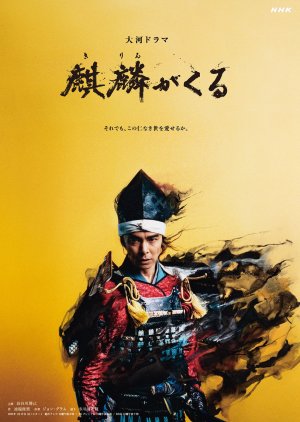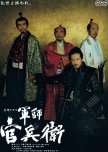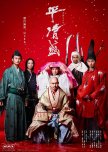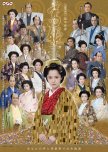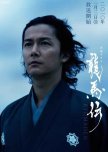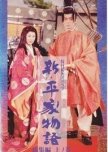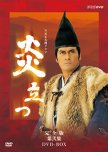
Uncovering the infamous historical figure Akechi Mitsuhide
First of all, let's get our historical fact check. Mitsuhide is no other than the warrior who assassinated Nobunaga. While this is surely an act of betrayal. Keep in mind that both figures aren't perfect. Nobunaga might be famous for being one of the unifiers but he is also famous for being brutal & ruthless. There is no bad or good side here.Mitsuhide might just also be one of the most mysterious historical figure of Japan. They don't have clear records of his childhood thus different to how Taiga dramas usually start (it most of the time starts with the lead as a kid) Kirin ga Kuru starts with Mitsuhide "Jubei" during his early days as a warrior just a few years before he becomes head of the Akechi clan.
When watching Taiga dramas I always look at the costumes, the way the characters talk, and the interior/sceneries. Costumes are on point, the acting & the way they talk truly takes you back to the sengoku period. Since Mino (Mitsuhide's hometown) is a village in the mountains there are scenes that captures the beauty of the mountainous region. Music was well matched depending on the scene although there aren't much. The opening is quite dark w/c is fitting to the destination of this story. I love openings of Taiga dramas including this so I recommend to not skip it, even just once, watch the opening credits as it is well made.
Hasegawa Hiroki as Akechi "Jubei" Mitsuhide and Sometani Shota as Oda Nobunaga reels you in with their portrayal. The way they talk, fight, or even just the way they stand, clearly creates the difference between these two men. They have a lot of scenes together and it was a feast watching these two great actors.
From the moment I started watching this, I've been wondering how would they end this, as most of us knows that Mitsuhide's life doesn't end in a good note. The ending was just right, a good take on one of the many assumptions on why he decided to turn his back on Oda.
Kirin ga Kuru "Awaiting Kirin", the title was mentioned a lot of times throughout the series. I like how they emphasized on it and explained this mythical creature the "Kirin". If you look at the poster for this drama, the black smoke-looking effect is actually a representation of the "Kirin". Try to look at paintings of a Kirin & you'll see the reference. I like what they did there.
Overall, I enjoyed this take on the mysterious man, Akechi Mitsuhide.
Just want to note that I am someone who mostly just watches Jdramas and interested in their culture and history. Please do read the tags/genre and plot before trying to watch this as this isn't your typical kind of drama.
Was this review helpful to you?
How to lose friends and not influence people
The Kirin is a mythical beast that emerges in times of peace. A symbol of peace then. All Might, but even more mythical.Peace is good. Therefore, summoning the Kirin must be too. But something is never given for nothing. Don't matter if you’re a Naruto or Full Metal Alchemist guy. The Japanese have taught you. Best of all, it's real!
The price of peace is violence and blood. All of them are consequences of the exertion of power. That changes people, and rarely for good. Weighty stuff for a drama to tackle. Kirin ga Kuru tries. That made it enjoyable enough. I’m more hesitant to conclude that it succeeded.
Kirin ga Kuru is a historical drama set during the Warring States era of Japan. Dai Nippon, the Weebs say. Sengoku Jidai to demonstrate your Total War: Shogun chops. Its central characters are Akechi Jubei Mitsuhide and Oda Nobunaga. Brutus and Caesar. They tried to summon the Kirin and died, friendless, for their trouble.
The narrative unfolds in three kinds of scenes. Cabinet scenes where the principals scheme, plan and monologue about their dreams. Truly top-notch and visceral battle scenes. I've come to appreciate the importance of excellently choreographed small-unit combat scenes. Troy is the standard, but the scenes here are the best I've seen since The Last Day in Changan. Finally, there are scenes that demonstrate the consequences of the cabinet scenes on the common folk—those fated to experience but rarely participate in history. I appreciated the touch. We commons rarely get shout-outs.
The battle scenes are its standout. Some of the monologues in the cabinet scenes could drag out, but I didn't mind much. I think the showrunners stuffed too many cameos from historical figures. Focusing on the machinations of the key players would have been preferable.
I also question the role of Doctor Toan, Koma and Kikimaru. They seem to act as the avatars of the audience and the common people. Yes, their presence often helps with plot exposition, but their role as main characters is awkward. I disagree with the director's choice to compress the narrative arc of multiple side characters into those three. Frankly, we spend too much time with characters who are unimportant in the story’s grand scheme.
I cannot fault professionals for their competence. Excellent acting is the baseline for any broadcast show, much like you expect basic spelling competence from me. That said, there are always levels to any craft. Sometani Shota as Oda and Sasaki Kiranosuke as Hideyoshi are particular standouts, immediately elevating all their scenes. The bad guys were cooler!
Kirin ga Kuru's is an artistic moving picture. Its cinematography is screensaver tier, and the musical team from John Graham down brings their orchestral and acoustic A-game! Haven't heard a soundtrack that good since Novoland: Pearl Eclipse.
Kirin ga Kuru doesn't drop the ball like Novoland did. But it, ultimately, isn't spectacular either. It's just there. It's The CW, not HBO, if you catch my drift. Interesting in patches but not something you'll be beating down doors to recommend.
Was this review helpful to you?

